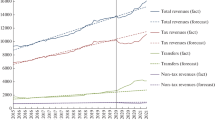Abstract
The subject of the study is tax revenues of the consolidated budgets of Russian federal subjects and their determinants. The objective is a quantitative assessment of the contribution of various sectors to the growth of tax revenues in the consolidated budgets of federal subjects and their factor decomposition. A four-factor additive–multiplicative model for the formation of tax revenues in the region is developed. Factors of tax revenues at the regional level in this model are the share of the sector in the regional economy (structural factor), its tax burden (fiscal factor), the level of internal absorption of tax revenues (interbudgetary factor), and the size of GRP (scale factor). To assess the contribution of these factors in regions and in the country at the aggregated and disaggregated levels, mixed factor analysis was used, including proportional, logarithmic, and integral methods. The study revealed that the largest contribution to the growth of tax revenues in the consolidated budgets of federal subjects came from the five largest regions, as well as a number of types of economic activity: manufacturing, combined financial and real estate operations, trade, and the mining sector. A change in the level of internal tax absorption on average contributed to a decrease in tax revenues to the budgets of federal subjects, while an increase in GRP, a change in the sectoral structure, and a change in tax profitability led to an increase in tax revenues to territorial budgets. The difference in the influence of these factors at the aggregated (country) and disaggregated (mid-regional) levels is explained by the degree of their interregional differences. The results of the study are applicable to assess potential tax revenues in regions, taking into account the possibilities of managing their determinants.






Similar content being viewed by others
REFERENCES
Malkina, M.Yu., Evaluation of the factors of Russian regions’ convergence/divergence in the level of budget provision based on the decomposition of the Theil–Bernoulli index, Prostranstvennaya Ekon., 2016, no. 3, pp. 16–37.
Malkina, M.Yu. and Balakin, R.V., Analysis of tax revenues in the Russian Federation, federal districts, and regions of the Russian Federation using the logarithmic method of factor analysis, Nalogi i Nalogooblozhenie (Taxes and Taxation), 2016, no. 2, pp. 190–208. https://en.nbpublish.com/library_read_article.php?id=-36316?id=-36316
Malkina, M.Yu. and Balakin, R.V., A factor analysis of changes in tax revenues for certain taxes in the Russian Federation in 2006–2014, Fin. Kredit, 2016, no. 32 (704), pp. 11–24.
Mishustin, M.V., Factors of growth of tax revenues: A macroeconomic approach, Ekon. Polit., 2016, vol. 11, no. 5, pp. 8–27.
Andrejovská, A. and Puliková, V., Tax revenues in the context of economic determinants, Montenegrin J. Econ., 2018, vol. 14, no. 1, pp. 133–141.
Braun, B.M. and Otsuka, Y., The effects of economic conditions and tax structures on state tax revenue flow, Int. Adv. Econ. Res., 1998, vol. 4, no. 3, pp. 259–270.
Castro, G. and Camarillo, D.B.R., Determinants of tax revenue in OECD countries over the period 2001–2011, Contadura Admin., 2014, vol. 59, no. 3, pp. 35–59.
Clausing, K.A., Corporate tax revenues in OECD countries, Int. Tax Publ. Fin., 2007, vol. 14, no. 2, pp. 115–133.
Das-Gupta, A. and Gang, I.N., Decomposing revenue effects of tax evasion and tax structure changes, Int. Tax Publ. Fin., 2000, vol. 7, no. 2, pp. 177–194.
Heim, J.J., Determinants of government receipts, in An Econometric Model of the US Economy, London: Palgrave Macmillan, 2017.
Karagöz, K., Determinants of tax revenue: does sectorial composition matter? J. Fin.,Acc. Manage., 2013, vol. 4, no. 2, pp. 50–63.
Mahdavi, S., The level and composition of tax revenue in developing countries: Evidence from unbalanced panel data, Int. Rev. Econ. Fin., 2008, vol. 17, no. 4, pp. 607–617.
Ohno, T., Hotei, M., Sato, E., and Umezaki, C., Decomposition of the variation of corporate tax revenues: based on consideration of corporate tax paradox, Publ. Policy Rev., 2015, vol. 11, no. 2, pp. 333–360.
Sharma, P. and Singh, J., Determinants of tax-revenue in India: a principal component analysis approach, Int. J. Econ. Bus. Res., 2015, vol. 10, no. 1, pp. 18–29.
Tax Aspects of Fiscal Federalism: A Comparative Analysis, Bizioli, G. and Sacchetto, C., Eds., Amsterdam: Int. Bureau Fiscal Doc., 2011.
Yushkov, A., Fiscal decentralization and regional economic growth: theory, empirics, and the Russian experience, Russ. J. Econ., 2015, vol. 1, pp. 404–418.
Zhang, J., Does a tax-sharing system make sense? Understanding China’s growth miracle, in End of Hyper Growth in China? New York: Springer-Verlag, 2016, pp. 21–49.
Funding
The study was supported by the Russian Foundation for Basic Research (project no. 19-010-00716).
Author information
Authors and Affiliations
Corresponding authors
Ethics declarations
The authors declare that they have no conflict of interest.
Additional information
The article was updated by the authors in 2020.
Rights and permissions
About this article
Cite this article
Malkina, M.Y., Balakin, R.V. Decomposition of Tax Revenue Growth in Russian Regions. Reg. Res. Russ. 10, 117–126 (2020). https://doi.org/10.1134/S2079970520020100
Received:
Revised:
Accepted:
Published:
Issue Date:
DOI: https://doi.org/10.1134/S2079970520020100




